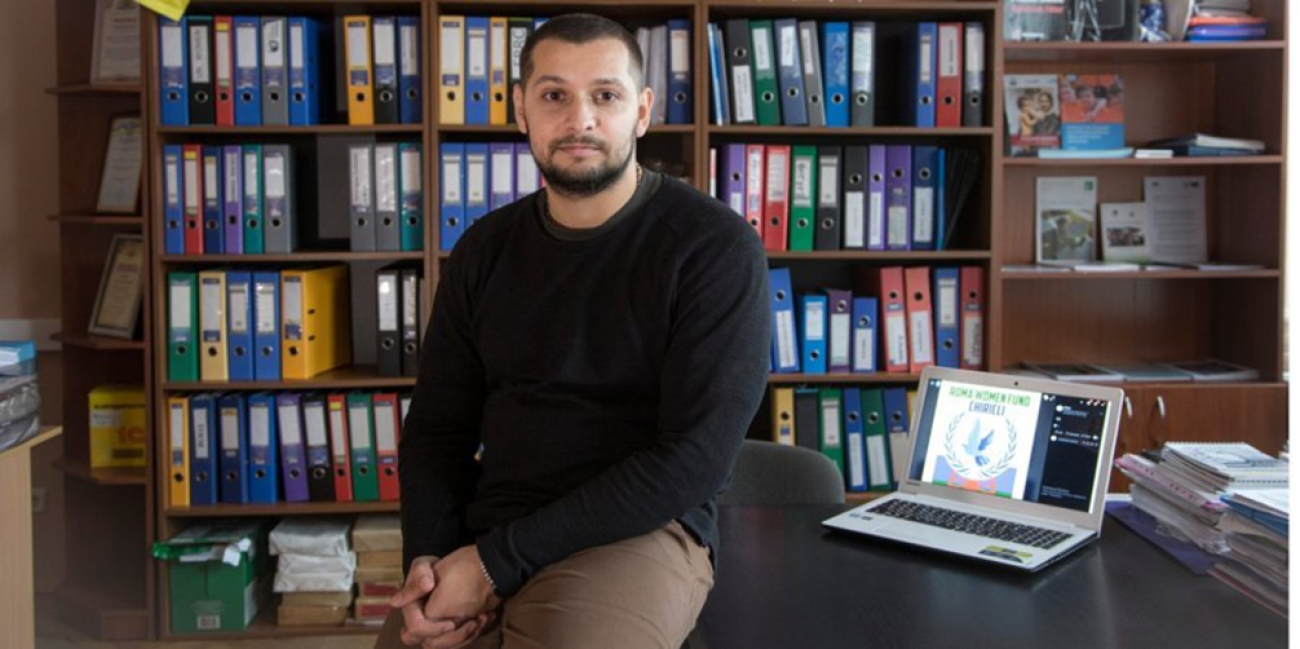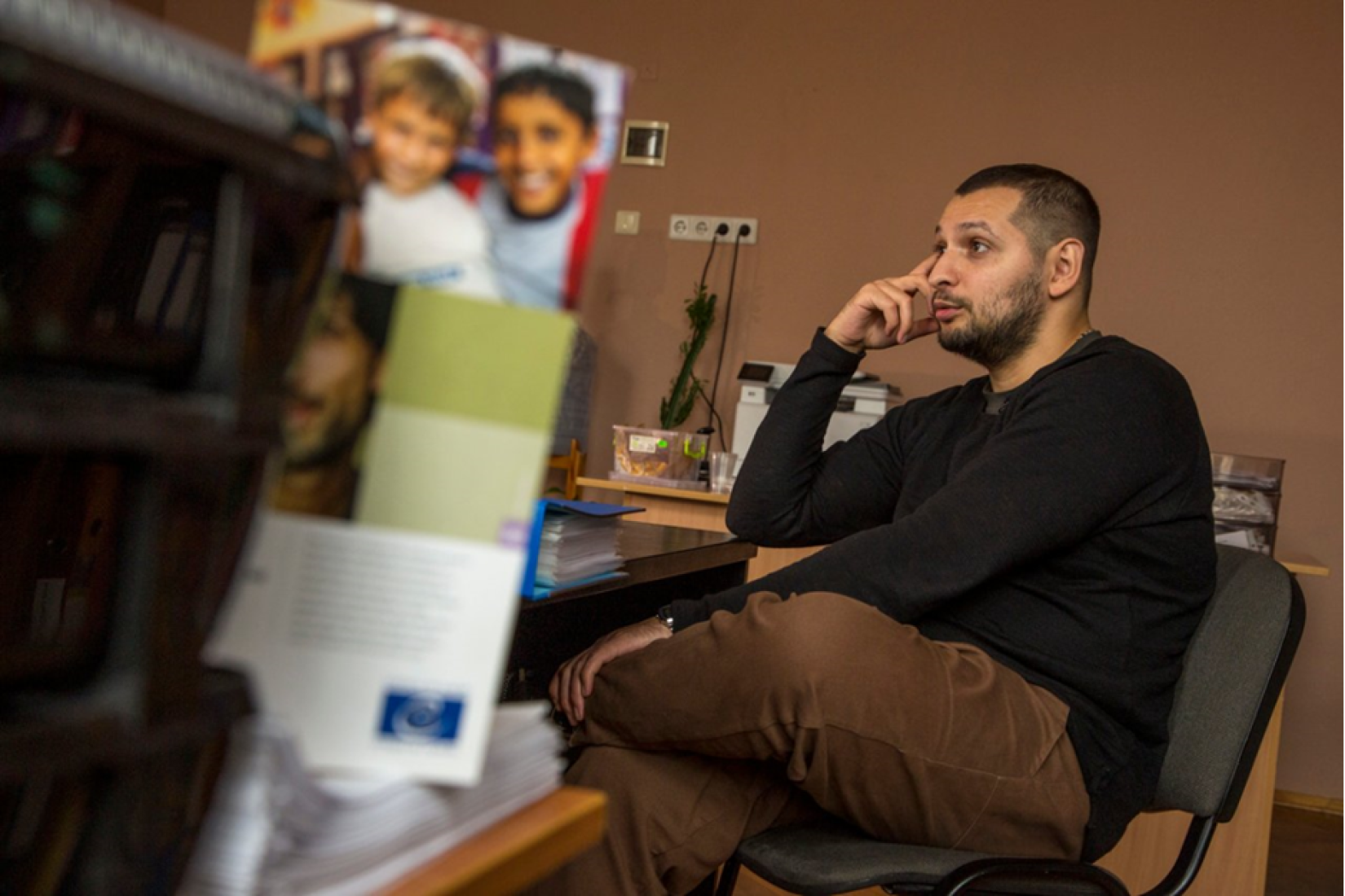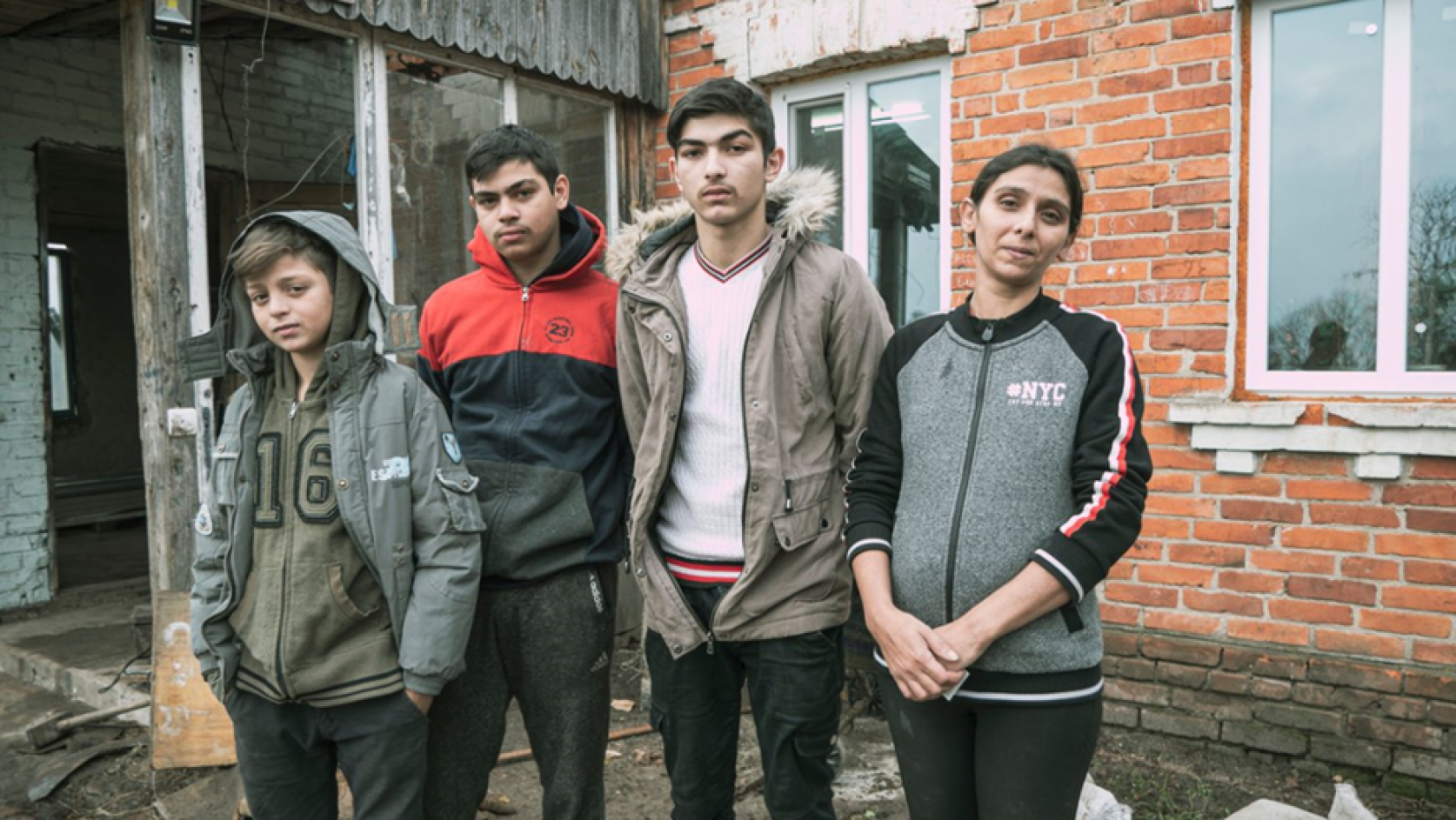"About 30,000 Roma in Ukraine have no documents." The story of a Roma activist

Julian Kondur talks about the difficulties faced by the Roma community in Ukraine during the coronavirus pandemic and the most common stereotypes about Roma.
The article was published on nv.ua on 2 December 2020.
A Roma activist Julian Kondur shares why Roma culture is associated with the criminal world and poverty, where most Roma live in Ukraine and what problems they have faced during the quarantine.
Ahead of the Human Rights Day celebrated on 10 December, NV media and the UN Human Rights Monitoring Mission in Ukraine are publishing a series of stories about how the pandemic has disproportionately affected people in vulnerable situations and why it is important to put human rights at front and center of the COVID-19 response.
Julian Kondur is a project coordinator of international charitable organization Roma Women's Foundation Chirikli. Julian comes from a family of Roma activists and human rights activists: his mother, Yulia Kondur, founded the Chirikli Foundation, his brother Volodymyr chairs the Roma Human Rights Center, and another brother, Fedir, heads Roma online radio station Chirikli. Three sisters - Lina, Zemfira and Kapitolina - also work in human rights. In 1993, his father, Anatoliy Kondur, founded one of the first Roma NGOs in Ukraine, the Izmail Roma Association.
“I started to be active in public life when I was still studying at the National Academy of Internal Affairs of Ukraine. My professional activity is now related to human rights, international law and international relations, the rights of national minorities - all this is in one orbit for me," says Julian Kondur.
In an interview with NV he talks about the difficulties faced by the Roma community in Ukraine during the coronavirus pandemic, explains how Roma settlements are provided with personal hygiene items, and mentions the most common stereotypes about Roma.
About coronavirus challenges
According to the UN Human Rights Monitoring Mission in Ukraine, the lack of identification documents by some Roma has been one of the factors that has significantly limited their access to healthcare since the beginning of the COVID-19 pandemic. Many Roma have also lost their jobs due to border closures and involvement in the seasonal and informal sectors of work.
Coronavirus has greatly affected us in terms of our effectiveness. We work in communities through Roma intermediaries - people who are either part of the Roma community, i.e. live in it, or who have a close relationship with the Roma community, and, accordingly, have respect and trust. During the pandemic, we had to reconsider how we would work next. So we moved to the format of calls, online meetings, whenever possible.
The other thing is our daily working meetings with partners, colleagues, with government agencies. All this has also moved online. In addition, we are trying to organize safe spaces where people can gather and talk offline.

It has been quite some time since the pandemic began. Initially we started collecting general information, for example, about the level of morbidity among the Roma, where it was possible to obtain such data. We were quite impressed when we saw that as of May-June the incidence rate [among the Roma community] was not too high.
However, the economic situation was already critical at that time. Many Roma work in seasonal jobs in other countries and thus earn a living. Therefore, due to the difficulty in crossing borders with European countries, many have lost the opportunity to work. Because of this, some people had no income and, consequently, no food.
With the introduction of quarantine measures, the question of the availability of personal hygiene products, such as masks, antiseptics, gloves, etc., also emerged. There was a need for all this and we started looking for resources to help people with it. Such support was found in the Renaissance Foundation that had created a special funds program to counter COVID-19. Part of the money was allocated to purchase personal hygiene products, and another part – to pay for our mediators, who risked their own lives while distributing this assistance [in Roma settlements]. By the way, none of them got sick.
As for medical care, everything here depends on the epidemiological situation, on the capacity of hospitals, on understanding how to treat, and so on. Awareness raising was often lacking too. When we interviewed people, some simply asked us how to treat coronavirus.
There are also many people with disabilities in the Roma community. Unfortunately, I can't say how many, because we generally have a problem with counting the number of population. About 30,000 Roma in Ukraine are undocumented, and some do not identify themselves as Roma due to fear, discrimination, and certain prejudices.
The most Roma-populated regions in Ukraine are Zakarpattia region and Odesa region. Accordingly, the most of various issues are concentrated here too, in particular how to provide people with everything they need. Every region has its own specifics.
How people live without documents
If we take a situation where a person has no documents and cannot be identified but needs medical care, then the health care reform does not play into our hands. If the declaration with the family doctor has not been signed, it seems that such people should not be taken to the hospital, and the ambulance should not come to them at all.
In fact, this is not the case, because Ukraine has signed the International Covenant on Human Rights - a number of conventions that along with other things guarantee everyone access to medical services. Also, sometimes such a thing as humanity works - with the help of the mediators. If a person is denied medical services, we can sometimes intervene and explain that nothing will be violated if these services are still provided.
Yes, we have indeed documented cases where people have been denied [hospitalization] despite a serious situation. But this problem was more related to the financial aspect: where to place this person, how to provide him/her with everything he/she needs during treatment, and so on. The lack of documents complicates the whole process.
We do not have such a possibility to call everyone and explain to everyone that there are some international conventions. However, Ukraine has a Strategy for the Integration of Roma into Society [Strategy for the Protection and Integration of the Roma National Minority into Ukrainian Society until 2020], and this document brings together interagency working groups to address similar issues.
According to the UN Human Rights Monitoring Mission in Ukraine, the rights of the Roma minority are protected by the general anti-discrimination provisions of Ukrainian law and complemented by the Strategy for the Protection and Integration of the Roma National Minority into Ukrainian Society. Although the Strategy for the Roma Minority enhanced the participation of Roma civil society in government policy-making, its implementation was underfunded, most of the expected results were not achieved, and the situation of Roma did not improve significantly from the pre-strategy. It is important that the new Strategy is effectively funded and implemented with the active participation of civil society. Progress can be seen under the condition of constant monitoring of the Strategy implementation progress.
Unfortunately, groups in vulnerable situations - not just Roma - are not always a priority at central, high levels [of decision making]. Our task is to make this situation change.
What can each of us do to help others? At the very least, to show interest. If you see a person who is in urgent need of something, you can first just talk to him/her - ask how he/she is doing, where he/she is from and why he/she is here. It seems to me that everything starts with communication. And only then does it become clear what to do next, where to send such a person.
I remember seeing a lot of internally displaced people in 2014. I often met such people on the streets of Kyiv, the people who did not know what to do. I gave them the numbers of organizations that can be contacted for help, addresses where to spend the night. Even a little dialogue can help someone feel important. That's why I call for communication.
About quarantine as an incentive for change
We really are in a crisis situation. The first month you sit at home, want to do something and help but not sure it's safe. You think what can be done, you start looking for options.

When we started helping the Roma people, these were simple points. For example, we gave them kits, which included seven cereals, butter, soap, toilet paper - such simple things. But it was more of a psychological aspect, because people said that it was valuable for them to feel someone take care of them. We then decided that it was also important to help adapt to similar phenomena in the future.
For example, our plans include working with small entrepreneurs, members of the Roma people, who have suffered losses due to quarantine. Our task will be to provide them with the skills to adapt the transition to modern realities: the implementation of their activities online, reformatting services to make them safer and much more. We already have preliminary agreements with the donor.
About human rights
Even today, not everyone understands what human rights are. I think we need to talk more about it, to talk in simple words. After all, this language is often very difficult.
Similarly, Roma’s awareness of their rights remains very low. But it is human rights that are about the certain minimum that everyone should have. In the case of the Roma, this is a set of historical, socio-economic consequences that need to be addressed. It is both a work with stereotypes and a fight against Roma biases.
One such topic, for example, is relations with law enforcement. We conduct training for police officers on the treatment of Roma, namely on the safety of Roma as a poor and isolated population. The second direction is to ensure law and order in public places.
The UN Human Rights Mission in Ukraine reported cases of hate speech, violence and aggressive rhetoric against Roma. Only recently, the media in Ivano-Frankivsk published articles depicting Roma through the prism of dangerous stereotypes. This caused a wave of hateful comments on social networks, which incited violence. Authorities should publicly condemn such cases, and law enforcement agencies must respond promptly to any calls for violence and investigate them effectively and promptly.
Unfortunately, opinions about the Roma are often made on the basis of the behavior of marginalized members of our people. In fact, every nation has different people. It is wrong to associate everyone with actions of one person. But this is exactly what we are constantly faced with.
However, in criminal justice there is no collective responsibility, there is individual responsibility. After all, even if a group of people commits an offense, everyone's guilt is considered individually. So in the case where one Roma - or even two, three, a hundred - stole a wallet at the station, it makes no sense to talk about collective responsibility.
Roma culture is often equated with the culture of the criminal world or the culture of poverty. This is due to the actual poverty of these people and their ignorance. I, for example, had the opportunity to learn and learn more about my people. That's how I learned that theft is not part of the [traditional] Roma culture at all.
Roma are people who have always done something with their own hands. These people made jewelry, tools, and so on. They were artisans. My grandfather, for example, was a blacksmith. And such professions were normal among the Roma. But over time, the Roma became more isolated, lost certain skills, and could not adapt.
One of the most common stereotypes is that Roma deliberately choose this lifestyle. As if they all like to live like this without exception. This is an interesting stereotype. We also looked into it during those exercises with the police. And they often heard the question: how to convince a person to earn differently if this person stole something and got some money here and now?
I do not justify such actions - from the point of view of the law they are absolutely illegal. But often people do such things because of the lack of alternatives. In general, the legal response to theft in our society is very poor. Sometimes the police do not record such things at all. There is no adequate reaction, and there is often a corruption component in such things, when someone from the government is interested in something. So, it doesn't look indisputable to me.
There is a lot of work ahead. And we see some improvements in the future when it comes to people's awareness of their rights.
The UN Human Rights Monitoring Mission in Ukraine emphasizes the importance of developing and implementing plans for economic recovery and social protection, taking into account the needs of the Roma or adjusting existing plans to build a better future for all.







